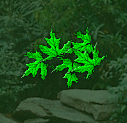


Using Mulch in Managed Landscapes
It is often stated that organic mulches benefit plant roots by insulating them from temperature extremes and decreasing temperature fluctuation in the root zone. Root-zone temperatures are considerably cooler under mulch during summer than under bare soil or turfgrass. High soils temperatures have been shown to cause fine root mortality of some trees. However, results of studies on root-zone temperatures under mulch have been inconsistent. Some studies have found that mulch increased winter injury of plants, while other studies have found no association between the presence of mulch and winter injury. Mulch can reduce the incidence of soil heaving caused by repeated cycles of freezing and thawing, which can severely stress plant by disturbing their root systems, particularly herbaceous perennials and newly planted trees and shrubs.
Mulch also is valuable for what it can exclude from the zone around woody plants. Research by Gary Watson and colleagues at the Morton Arboretum showed that roots density of mature littleleaf linden, green ask, sugar maple, and red maple trees was greater under mulch than in bare soil and far greater than under turfgrass. Tufgrass roots have a competitive advantage over tree roots because of their greater density and close proximity to the soil surface. Competition with turfgrass for soil moisture becomes especially problematic for trees during periods of drought. Conversely, it is often difficult to maintain high quality turf beneath the canopies of mature trees. A mulched zone around trees protects against mechanical injury to tree roots growing on the surface, especially for shallow-rooting species. A frequent recommendation is to buffer trees and shrubs with mulched zone that extends from near the trunk to the drip line. Another advantage of isolating trees from turf is prevention of mower blight. Mechanical damage to the trunk frequently reduces the vigor and life span of landscape trees by disrupting water and nutrient translocation and by creating entry points for pathogens and decay-causing fungi.
Organic mulches can dramatically impact soil microbial activity and nutrient availability. Mulches with a high carbon-to-nitrogen ration, such as hardwood bark, ground wood pallets, straw and sawdust can induce nitrogen deficiency in plants by stimulation microbial growth, which depletes underlying soils of available nitrogen. On the other hand, mulches such as composed yard waste and wood or bark blended with composted sewage sludge can increase soil fertility and plant growth because their low C;N ratio resembles high quality forest litter. As with plants, soil microorganisms require energy and essential nutrients to grow and reproduce. Whereas plants derive their energy from carbon acquired from the atmosphere via photosynthesis, the carbon in decomposing organic matter provides soils microbes with their energy supply. However, both plans and soils microbes use the same pool of essential soil nutrients. Because nitrogen is the nutrient that most often limits plant growth, the effects of mulch on soil fertility generally is determined by how mulch impacts the competition between plants and microbes for this key nutrient. Organic matter with a high C;N ration (greater than 30:1) does not contain enough nitrogen to fully support microbial growth. Therefore, microbes must scavenge additional nitrogen from the soil as they decompose high C;N mulch (1-2 lbs N/1000 ft2 is often recommended) can relax nitrogen competition between plants and microbes and stimulate plant growth.
|
|
